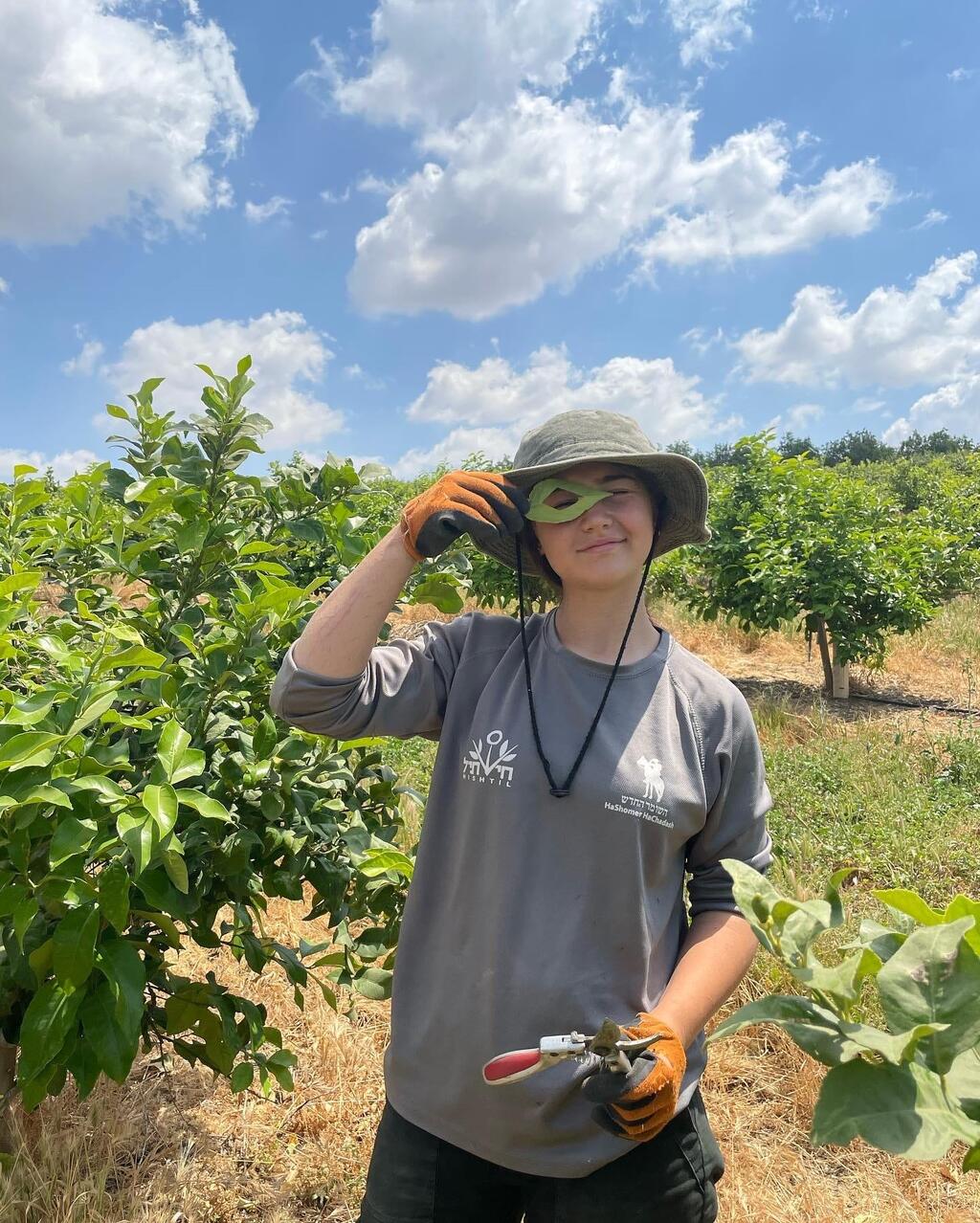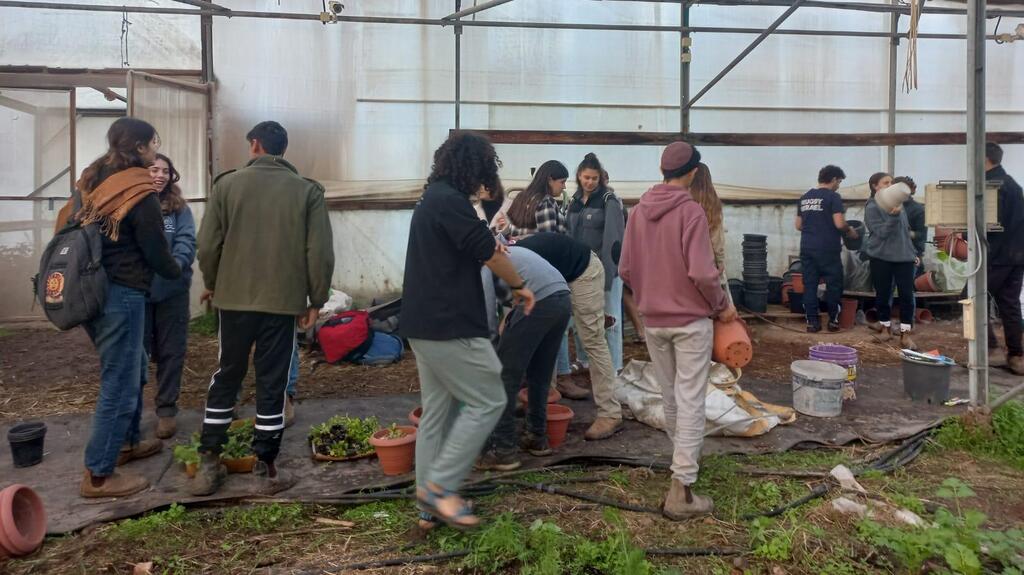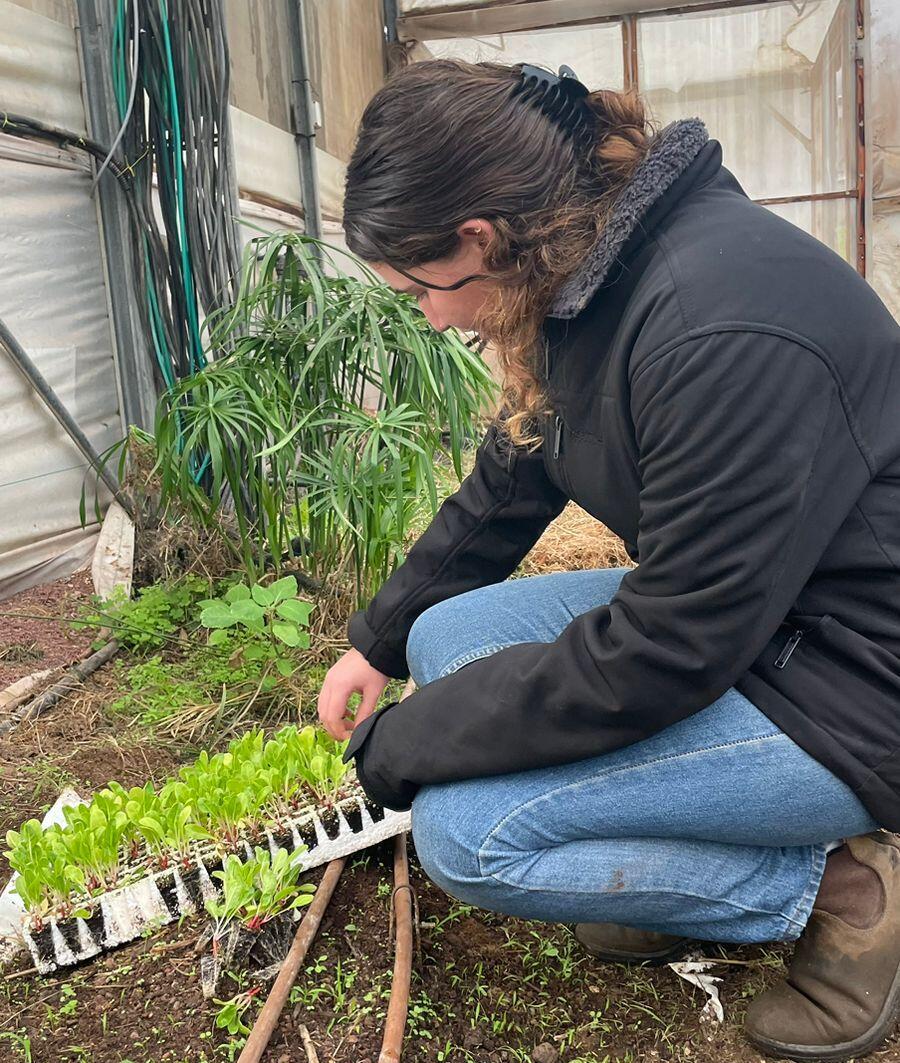When 10th graders from the agricultural high school Adam V'Adama (Man & Soil) finish their school day, they roll up their sleeves and cultivate vegetables which they then donate to Holocaust survivors and those in need. "Our motto is to always be working for the benefit of others," the project's founder, Yuval Krinkin, says.
Read more:
When Yuval, 17, from Mevasseret Zion, and other 10th graders from the agricultural high school Adam V'Adama returned to the school in Tavor after the first few weeks of Israel's war on Hamas in Gaza she immediately looked for ways in which she and her friends could assist Israel's home front.
3 View gallery


Yuval Krinkinin looked for ways in which she and her friends could assist Israel's home front
(Photo: Private collection)
And so, in addition to the emergency assistance they gave farmers who were left without workers, Yuval decided to set up an initiative to grow vegetables and donate them to the charity Ezer LaZulat (Helping Others) in Afula, which donates fresh vegetables and hot meals to those in need and to Holocaust survivors.
To make the initiative happen, she recruited her school friends who, like her, also live on the school's campus which is part of the umbrella group of schools called Adam V'Adama run by HaShomer HaChadash, where alongside studies toward their high school diploma they also train in education and agriculture, and help the community.
"The initiative arose from a deep-seated wish of mine and all the students of Adam V'Adama to utilize all our skills for the greater good. When I got in contact with the charity Ezer LaZulat, I understood that initiatives like ours help answer a need and bring light and joy to many people," according to Yuval. "It makes me feel proud to be part of a group that doesn't wait for a leader or some kind of sign, and simply works and innovates in an independent way. Our motto is to always be working for the benefit of others, to demand from ourselves all that we can give from a place of joy."
Was it difficult to convince your friends to join?
"Not at all. They were very excited to hear about the initiative, and signed themselves up right away. In the first weeks, a lot of difficult work was required such as removing weeds and, thanks to the huge recruitment of volunteers, we managed to finish it very quickly. It's not always easy after a day's work or study to continue working, and despite this we all happily pitched in."
'Youth isn't aware enough of farmers' struggles'
During the first stage of the initiative, the students looked for a plot of land on which to grow the vegetables in order to donate them to the charity. After a fairly thorough search, they found an unused plot inside a greenhouse in the Kadoorie Agricultural Youth Village.
They began by weeding the plot, after which they turned the soil and mixed it with compost and, finally, they made sure the greenhouse was fit to be used and readied it for planting.
After they finished preparing the soil, they planted a range of winter vegetables: lettuce, chard, fennel, celery, radish and spring onions. Growing was done organically, without using fertilizers and chemical pesticides. Once a week, throughout the seedlings growing process, the students participating in the initiative came to the greenhouse in their own free time to weed the plot to allow for the best possible growth of the vegetables. Last month the first harvest of lettuce took place, and was successfully donated to the charity.
To what extent are the youth aware of the difficulties of the farmers in Israel during the war, and in general?
My friends from the Jerusalem area, where I live too, spoke to me about a few fleeting volunteering activities they went to, but nothing more than that," Yuval explains. "Those that don't see the rotting fruits on the ground and the tired farmer that suffers from a lack of workers can't really understand how bad the situation is. Reading the news every day doesn't get across the real need that exists in the world of agriculture right now."
"The youth truly want to volunteer and they are able to help, and therefore its very important to expose them to the desperate situation that farmers find themselves in. Only that way will we be able to bring them on board with this important mission," she adds.
Shukyy Askayo, an agriculture teacher At Adam V'Adama who also led the students throughout the initiative, tries to instill the message of helping others. "The ability of the teenage students to look beyond themselves, to see the other and do something meaningful for others, is not taken for granted. May we succeed in educating as many students as possible to see those in need and help them, from an understanding that 'today I can help, tomorrow I might need help.' We all live in one country, and so its important and necessary to improve the standard of living of every resident of Israel, for our future as well."
The manager of the charity Ezer LaZulat, Sandy Ben Zaken, says the beneficiaries of the charity were excited about the initiative and the fresh produce that they received from it. "Cooperating with the students was great. They rang us at the beginning of the project, and inquired about the needs of the charity. They then matched which vegetables they grew to the information we gave them. In addition, they were always warm and welcoming," says Ben Zaken.
Since the start of the war, many families have started receiving help from the organization. In addition, many of the elderly and Holocaust survivors are scared to leave their homes at this time, so the charity set up a delivery system that brings them their meal to their door.
"The elderly and the Holocaust survivors suffer from loneliness during these times, and some worry about the missile sirens and hunker down in their houses for days. Before the war, they would come to us at the charity to receive meals, all the while meeting other people and starting conversations with them; now there are those who don't leave the house for weeks at a time. They worry they won't be able to reach a bomb shelter should they need to, and that stops them leaving the house, which is a big problem for them," Ben Zaken explains.



